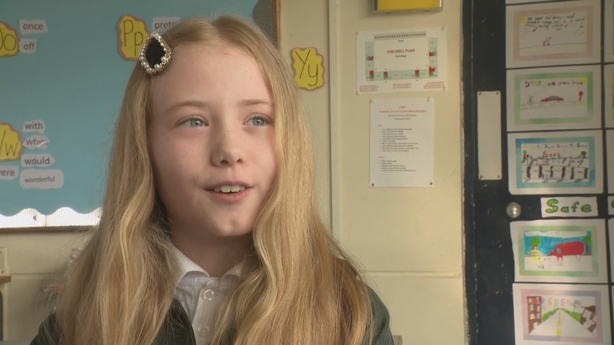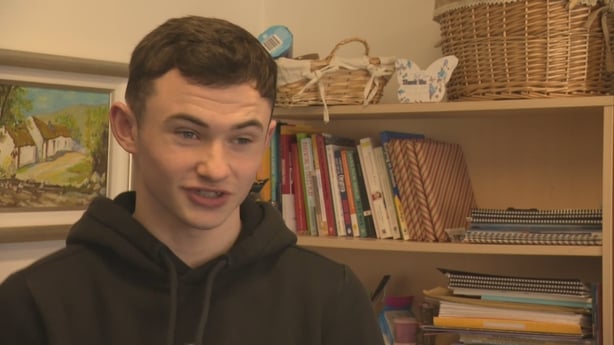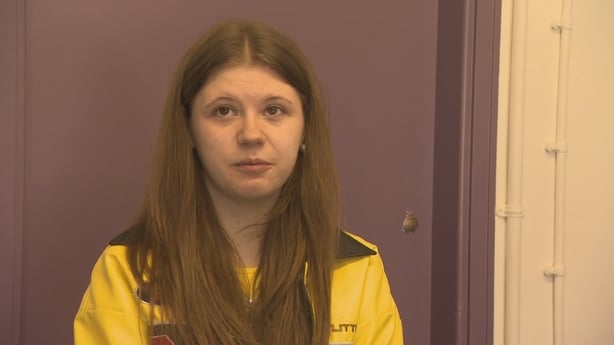"That's me!", "there’s Tommy!" There was laughter and squeals of delight as fourth class pupils at St Joseph's National School in Dublin’s Coolock looked back on footage taken at their school five years ago when the school closures were announced.
These pupils were in junior infants then and on 12 March 2020 we filmed as they formed a line and received little parcels of learning materials from their teacher Ciara Sotscheck as they left the classroom, no one with any idea as to when they might return.
Now in fourth class their memory of that time seems extraordinarily vivid.
'Lonely for kids'
"I remember just all of us going home and then, like, in the few following days we got Play-Doh and lunches from the school and we’d be on Zoom calls. I just remember missing all my friends and yeah it was kinda sad," said Leila Fleming.
"I remember I got Student of the Week and then Ms Campbell came to my house and delivered the homework pass and a bag of sweets and the Black Panther. That was the little toy you got to bring home to keep for the week," Tommy O’Brien reminisced.
The Black Panther, the Zoom calls, and the games Ms Sotscheck encouraged them to play all loom large in the memories of these children. They are hugely positive memories. They describe their excitement at the Zoom classes and how they were a lifeline.

Marc Boylan describes the 'colour game': "I remember Ms Sotscheck used to say 'find a colour' and we’d all just scatter in our houses to try and find something of that colour and bring it to the computer.
"She did really good stuff. She kinda told us what games to play and she talked to us to see how we were doing, and I remember Liverpool won the Premier League that year."
"Our teacher Ms Sotscheck, the first Zoom call we done she asked us to tell her how we feel, and to show her our little projects and she would play little games with us. And she had caterpillars and we had them for a long time and then they turned into butterflies," Kayleigh McGillivray remembers.
Five years ago we spoke to two sixth class pupils at the school too, Molly Rose Richardson and Jack O’Shea. They were sad and confused at the news that their school was closing that day and Jack was very concerned that they might miss their confirmation.
'I was lost'
While most expected the school closures to last no more than a few weeks Jack turned out to be right. This week these two students, now in fifth year in secondary school, looked back.
"At first I just felt it was nothing, that it was just one of those conspiracies that you wouldn’t believe, but then it really hit us," Jack said.
"I was just lost. I was just at home. Normally I would be playing football or doing something outside but you couldn’t leave the house at all."
Does he think the pandemic lockdown damaged his generation?
"Yeah and no," he said.
"I think it did because everybody started playing more PlayStation or going on their phone, like you lost friends along the way, friends that you had in primary that you wouldn’t have now, because you didn’t get to hang out with them."
"Lost and confused," sums up Molly Rose Richardson’s memory of how she felt at the time.
"It was mental. The world just closed off, and living with my two brothers as well it was so hard on my mam, like nothing to do all day."
"We were so young we didn’t really understand it, like how could a virus shut down the whole world, and like not being able to do the hobbies I was doing at the time, it was hard not being able to see my friends. I couldn’t even go to school."

Molly Rose feels that the break in routine has damaged her generation. She lists all the things her age-group lost out on; confirmation ceremonies, finishing primary school, beginning secondary school in masks.
"The hobbies that we loved," she says, "we just fell out of them and we didn’t take them up again after the pandemic".
"You couldn’t even sit beside your friends in class." But all that is in the past now. "I have my life back now," she says.
Schools however, five years on, are still grappling with the fallout.
"Without a doubt our area for attention is with attendance, said Principal of St Joseph’s Rosemarie Gaffney.
"We are trying to encourage to make a really concerted effort with children, to encourage them to be in school every day, five out of five.
We need your consent to load this rte-player contentWe use rte-player to manage extra content that can set cookies on your device and collect data about your activity. Please review their details and accept them to load the content.Manage Preferences
Data from Tusla shows that school attendance has fallen significantly since the pandemic, with more than one in four primary school students and one in five secondary school students missing out on 20 or more school days during the 2022/23 school year.
The problem is most marked in disadvantaged areas where 43% of primary school students, and 30% of post-primary school students in schools with the highest levels of disadvantage missed 20 school days or more.
Before the pandemic the average percentage of primary pupils who missed more than 20 days of school per year was 11.6%. At second level it was 15%.
Ms Gaffney is also concerned by the growing level of need among children for therapeutic supports.
"A lot of parents are asking me for therapeutic supports for their children," she said. "The children are looking to us, the people they see day-to-day, to help them."
Like other DEIS and mainstream schools too, this school feels unable to provide the level of care and support that the children need. It is a resourcing issue.
"We would like to be able to offer more disciplinary supports to the children. There is a greater need now," Rosemarie says.

Schools across the country, both primary and secondary, report similar concern around a growing need for supports. DEIS schools say many of their pupils cannot access the curriculum fully because of the level of trauma that they are dealing with in in their lives and the lack of therapeutic supports to help them cope with that trauma.
Many schools are reluctant to speak too openly about the needs of the families they serve, out of respect for those families.
A home school community liaison teacher at another disadvantaged primary school, who did not wish to be identified, spoke of the rising complex needs of many families in disadvantaged communities.
"We have a lot more struggling parents now. In the last three years we have seen a rise in the number of mothers using drugs, sometimes they tell us and sometimes we just know. There is a lack of resilience caused by those complex needs."
These needs stem from the cost of living, the impact of drugs, domestic violence, mental health problems, or homelessness, they said.
This teacher puts increased absence levels down to a variety of reasons, including the break in routine caused by the pandemic.
"Before the pandemic you just went in, but then all of a sudden it became normal not to come in."
They report higher levels of anxiety and also a lower ability on the part of parents to deal with the kind of issues that commonly arise between children or in schools that are a normal part of growing up.
For both parents and children "resilience can be an issue," they say.
"Attendance, definitely," said Lesley Byrne, Principal at Clogher Road Secondary School on the other side of Dublin city, when asked about the lasting effects of the school closures. "There are different patterns and habits now."
"Pre pandemic you would have had a sense that if you missed any school it was bad but there is perhaps a slightly looser feel to it now."
"Also with health, sometimes if a pupil has a sniffle or a cold now, they don't come in. There is a sense that if they are sick, they are sick. Before that, both for pupils and teachers, sometimes even if they were quite sick they would have dragged themselves in. That doesn't happen anymore."
When it comes to learning, Lesley Byrne sees an ongoing impact too.
"The first years coming in, they have missed really vital developmental years in primary school and that really shows when it comes to literacy, reading, and handwriting."
"We know that when students came back in to primary schools after the closures there was a catch up done at speed in order to attempt to prepare them for secondary school and that deeper in-depth learning doesn't seem to have happened. We can really see the gaps in students."
Ms Byrne reports "huge raised levels of anxiety among young people". She is not sure whether or not this is related directly to the pandemic and she too points to a worrying lack of support for young people in need.
"There are so many young people whose mental health situations are very critical and there just aren't the supports. Even for the child who has clearly displayed an extreme need, through certain actions, even they are not getting seen immediately."
This principal does also report some positives, such as a positive impact on relationships post the pandemic.
"When the masks came off, there was such a sense of relief. There was a sense of the importance of relationships and a reminder of how important all that interaction is in schools," she says.
Back over in Coolock, Jack’s views on the pandemic too are not all negative. Both he and Molly Rose are sanguine and they are looking to the future "Sometimes you’d be ‘ah do you remember Covid? We didn’t know what to be doing," Jack said. "But we are all right now."







